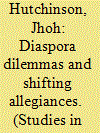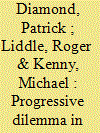| Srl | Item |
| 1 |
ID:
096842


|
|
|
|
|
| Publication |
2010.
|
| Summary/Abstract |
Focused on the London Irish, this article discusses the diasporic dilemmas of Irish Catholics in England who oscillated between four claims to loyalty in the early twentieth century. Liberals and later the labour movement sought to mobilise them for radical political and socialist goals; the Catholic Church to support religious education against secularist threats; a homeland nationalism to advance the prospects of Irish parliamentary autonomy; and a diasporic nationalism to defend their ethnic interests in England. These pressures peaked during the First World War and the Irish War of Independence. The overall effect of this nationalist mobilisation may have been to advance their integration into English social and political institutions.
|
|
|
|
|
|
|
|
|
|
|
|
|
|
|
|
| 2 |
ID:
152548


|
|
|
|
|
| Summary/Abstract |
This special edition reflects on the contemporary relevance of the insights and concerns of David Marquand's book The Progressive Dilemma. In this Introduction, the editors set the scene for these reflections. They consider the structural changes that have occurred in politics since the 1990s: the impact of globalisation, the erosion of class identities, the rise of ‘identity politics’ and the continued fragmentation of the party system. There has been no reconciliation between the parties of the centre-left, nor any re-examination of the ‘liberal tradition’ and the potential for a new synthesis with revisionist social democracy. On the one hand, Corbynism is a radicalised metropolitan species of liberalism, while on the other there are plenty in Labour who stress the need for the party to re-engage with the traditional, socially conservative values of the working class in a new ‘postliberal’ appeal. Yet the authors argue that those who broadly identify with progressive causes in British politics—animated by the various overlapping strands of social liberalism, social democracy and liberal socialism—have still to work out how to address the historic failings that Marquand so eloquently exposed, to create a new and inspiring intellectual vision that unites and energises the left and centre-left.
|
|
|
|
|
|
|
|
|
|
|
|
|
|
|
|
| 3 |
ID:
152560


|
|
|
|
|
| Summary/Abstract |
Jeremy Corbyn's election and re-election as Labour leader, together with the emergence of a new Conservative Prime Minister committed to Brexit, has led to renewed speculation about the possibility of a new party appealing to the ‘politically homeless’ in the centre and centre-left of British politics. This article draws lessons from the SDP experience in the early 1980s. Are the structural conditions more favourable to the progressive centre-left now than they were then? Is there the sociological, electoral and ideological space for a new party? Does first past the post remain an insuperable barrier to an electoral breakthrough? From whom and in what circumstances might the leadership for a new party come? For all the depth of Labour's current problems, a new party seems an unlikely immediate prospect. In 1981, the SDP made a major miscalculation about the irreversibility of Labour's decline. However, the process of fragmentation in British politics seems set to continue.
|
|
|
|
|
|
|
|
|
|
|
|
|
|
|
|